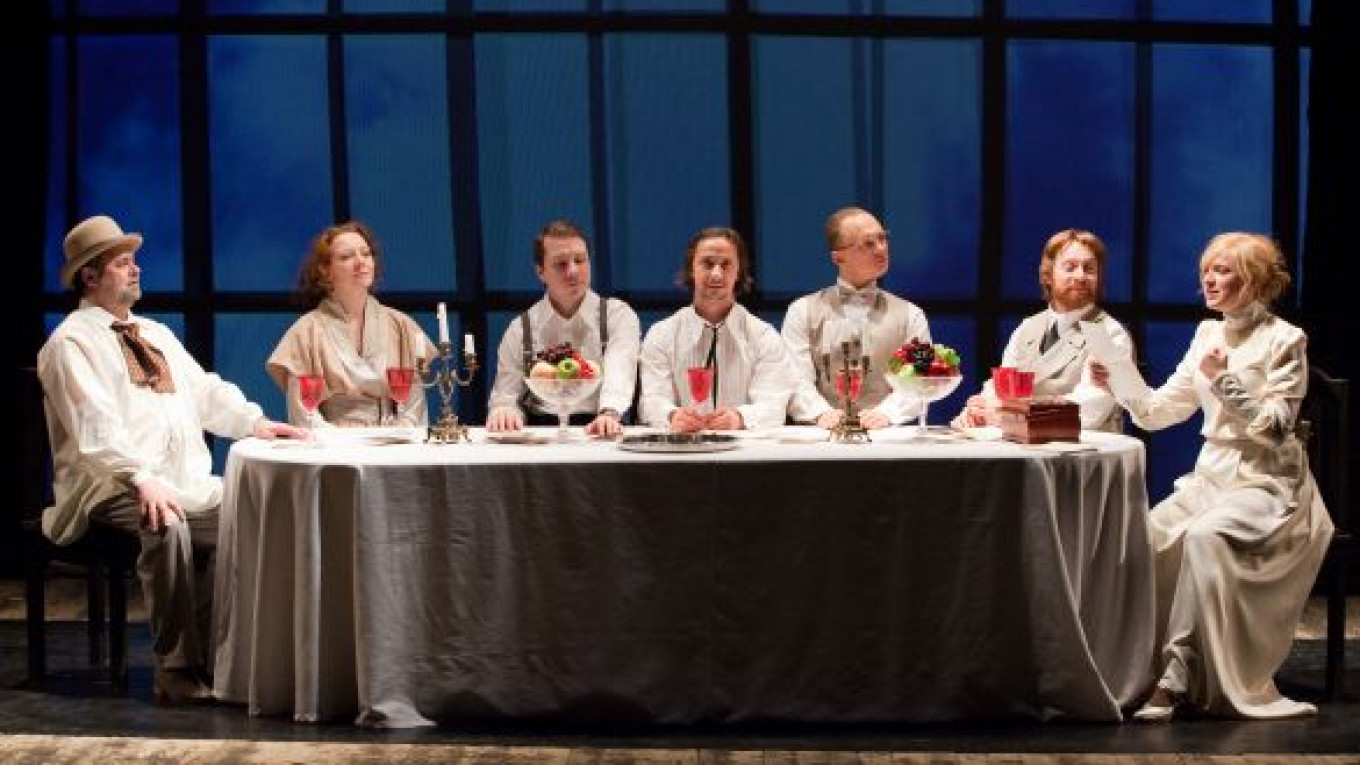Vladimir Ageyev's production of Viktor Slavkin's "Cerceau" for the Drugoi Theater is something of a wonder. Not only because it is a fine performance — and it is that — but also because it is one of those extremely rare instances where various historical eras are compacted in a single event.
"Cerceau" stands among a handful of the most famous Russian plays of the 1980s. Staged by the legend-in-waiting Anatoly Vasilyev in 1985, it was a success that served as the final push that led to the creation of Vasilyev's mighty School of Dramatic Art in 1987. "Cerceau" became a thing of history almost immediately. Its cast members, director, author and even some of those who worked behind the scenes are spoken of with reverence to this day.
Because of the huge impact of Vasilyev's production, the play fell through the cracks in ensuing years. What director would dare take on a text that had been staged "flawlessly" and remained so vivid in the public's imagination? For the record, this impressive but dubious fate befell Slavkin's other major play, "A Young Man's Grown-up Daughter," which Vasilyev staged in 1979.
But this is only the beginning of the gold dust that Ageyev's production stirs up.
It is nothing less than a shock to hear Slavkin's utterly timeless language. In it you hear direct echoes reaching back to Anton Chekhov, just as you detect a direct lineage reaching forward in time to such varied contemporary writers as Olga Mukhina, Klim and others. Slavkin's dialogue, his boldly funny word choices and his fractured phrasing bring together at least 120 years of Russian drama in a single text.
One hears now, too, what so stunned audiences in 1985, a politically volatile age in which a country was beginning to collapse: an utter and total disregard for "news from the street." The language and characters are unmistakably contemporary, but first and foremost they exist outside of time. This allows us to consider them within the category of the eternal, and indeed they strike us as being prototypically Russian. They are dreamers and thinkers, lazy and impractical, wise and silly. They are fascinated by life and all the pain and temptations it sends.
This immersion in the personal-eternal, as opposed to offering an outward glance at, perhaps, another government imploding, is striking in our day, too. Once again, "Cerceau" has a distinct sense of freshness and innovation, even though we know it was written 28 years ago.
In the play, an "aging" man of 40 named Petushok invites a group of solitary friends — they are not "lonely," he insists, just "alone" — to join him at a country house. Their chats, spats and flirtations are interrupted by the appearance of Koka, an old man who may hold the deed to the house. He once was married to its owner for eight days.
Koka's presence throws the friends deeper into an atmosphere of nostalgia, as do the old costumes and wooden swords and rings for the French game of cerceau that they discover lying around. Old love letters are read aloud, new letters of confession are composed impromptu for all to hear. Brief love trysts take place on a ramp among the spectators or behind a screen on which various images of nature and weather are projected.
A scene of the murder of Tsar Paul I is enacted, the only tangible reference to anything political, perhaps a vague reminder that history in Russia leaps forward only thanks to cataclysms.
Alexei Bagdasarov's performance of Koka is endearing, funny and clumsy all in one. Often speaking in an elevated, even pompous, manner, he brings a sense of lost style and tradition to this ageless but modern world.
In the second act of Ageyev's production, nostalgia is replaced by a foreboding, post-apocalyptic atmosphere before flowing back naturally to a jocular tone. Marina Filatova's set now shows a burned-out rotunda on the screen where burgeoning nature once bloomed. Irina Grinyova, as the wistful Nadya, pushes suitcases across the stage like Sisyphus pushed a rock up a mountain, while others stagger and fall as if their legs refuse to hold them.
In a final scene that plays like an epilogue, the characters sit together sharing jokes and funny tales. This segment is crowned by Alexei Dubrovsky's hilarious lecture on eating habits, although neither it nor any other witticisms can hold off impending tragedy.
Thought-provoking, sometimes comical and always haunting, Ageyev's production of Slavkin's "Cerceau" returns a classic play to the stage in style.
"Cerceau," a production of the Drugoi Theater, plays Monday and Feb. 24 at 7 p.m. at DK Zuyeva, 18 Lesnaya Ulitsa. Metro Belorusskaya. 8-499-973-2141. . Running time: 3 hours, 15 minutes.
Contact the author at jfreedman@imedia.ru
A Message from The Moscow Times:
Dear readers,
We are facing unprecedented challenges. Russia's Prosecutor General's Office has designated The Moscow Times as an "undesirable" organization, criminalizing our work and putting our staff at risk of prosecution. This follows our earlier unjust labeling as a "foreign agent."
These actions are direct attempts to silence independent journalism in Russia. The authorities claim our work "discredits the decisions of the Russian leadership." We see things differently: we strive to provide accurate, unbiased reporting on Russia.
We, the journalists of The Moscow Times, refuse to be silenced. But to continue our work, we need your help.
Your support, no matter how small, makes a world of difference. If you can, please support us monthly starting from just $2. It's quick to set up, and every contribution makes a significant impact.
By supporting The Moscow Times, you're defending open, independent journalism in the face of repression. Thank you for standing with us.
Remind me later.







